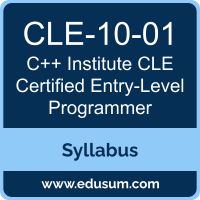 Use this quick start guide to collect all the information about C++ Institute CLE Certified Entry-Level Programmer (CLE-10-01) Certification exam. This study guide provides a list of objectives and resources that will help you prepare for items on the CLE-10-01 C++ Institute CLE - C Certified Entry-Level Programmer exam. The Sample Questions will help you identify the type and difficulty level of the questions and the Practice Exams will make you familiar with the format and environment of an exam. You should refer this guide carefully before attempting your actual C++ Institute CLE - C certification exam.
Use this quick start guide to collect all the information about C++ Institute CLE Certified Entry-Level Programmer (CLE-10-01) Certification exam. This study guide provides a list of objectives and resources that will help you prepare for items on the CLE-10-01 C++ Institute CLE - C Certified Entry-Level Programmer exam. The Sample Questions will help you identify the type and difficulty level of the questions and the Practice Exams will make you familiar with the format and environment of an exam. You should refer this guide carefully before attempting your actual C++ Institute CLE - C certification exam.
The C++ Institute CLE Certified Entry-Level Programmer certification is mainly targeted to those candidates who want to build their career in C Programming domain. The CLE - C Certified Entry-Level Programmer exam verifies that the candidate possesses the fundamental knowledge and proven skills in the area of C++ Institute CLE - C.
C++ Institute CLE Certified Entry-Level Programmer Exam Summary:
| Exam Name | CLE - C Certified Entry-Level Programmer |
| Exam Code | CLE-10-01 |
| Exam Price | $69 (USD) |
| Duration | 45 mins |
| Number of Questions | 30 |
| Passing Score | 70% |
| Books / Training |
C Essentials 1 – Cisco Networking Academy (Go to Cisco NetAcad) C Essentials 1 (CE1) – OpenEDG Learning Platform (Go to OpenEDG Edube) |
| Schedule Exam | OpenEDG Testing Service - TestNow |
| Sample Questions | C++ Institute CLE Certified Entry-Level Programmer Sample Questions |
| Practice Exam | C++ Institute CLE-10-01 Certification Practice Exam |
C++ Institute CLE-10-01 Exam Syllabus Topics:
| Topic | Details | Weights |
|---|---|---|
| Basic Concepts |
- Explain the purpose of compilation and describe the role of the compiler and IDE. - Distinguish between language elements, lexis, syntax, semantics, and portability. - Identify valid literals: characters, numbers, strings, and scientific notation. - Use printf() and puts() functions for output; describe the role of the main() and return. - Understand numeral systems (binary, octal, decimal, hexadecimal). - Apply basic arithmetic operators and declare variables. |
13.25% |
| Data Types, Evaluations, and Basic I/O Operations |
- Differentiate between primary and derived data types and use type modifiers. - Perform type casting and conversions. - Declare variables, assign values, and define constants. - Use scanf(), puts(), and printf() for input/output and format output using specifiers. - Recognize header files and perform basic calculations. |
13.25% |
| Arithmetic, logical, and bitwise operators |
- Use unary and binary operators, respecting operator precedence and associativity. - Perform arithmetic calculations and rounding operations. - Use increment/decrement and compound assignment operators. - Apply bitwise shifts (>>, <<) and logical operators (AND, OR, NOT). - Construct and interpret truth tables. |
13.25% |
| Flow control: decision-making statements |
- Apply conditional statements: if, if-else, if-else if, if-else if-else. - Use multiple and nested conditions. - Implement switch, case, and default statements. - Understand control instructions. |
13.25% |
| Flow control: loops |
- Use loop constructs: while, for, and do...while. - Iterate through sequences and recognize infinite loops. - Understand loop structure, nesting, and execution. - Control loops using break and continue. |
16.50% |
| Arrays, pointers, and memory management |
- Create and manipulate single- and multidimensional arrays. - Use initiators and sort array data. - Declare and manipulate pointers, including NULL, arithmetic, and references. - Distinguish between pointers and arrays. - Perform memory allocation with malloc() and deallocation with free(). |
16.50% |
| String manipulation |
- Use character arrays and ASCII codes. - Initialize and process strings. - Apply string functions: strcpy, strlen, strcat. - Use string header files. |
7% |
| The Basics of Functions |
- Define, declare, and invoke functions. - Use parameters and return values. - Recognize and apply selected C standard library functions. |
7% |
To ensure success in C++ Institute CLE - C certification exam, we recommend authorized training course, practice test and hands-on experience to prepare for C++ Institute CLE - C Certified Entry-Level Programmer (CLE-10-01) exam.
